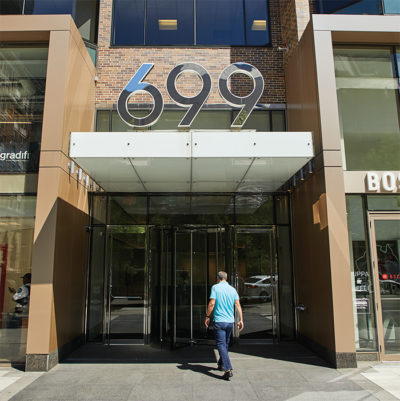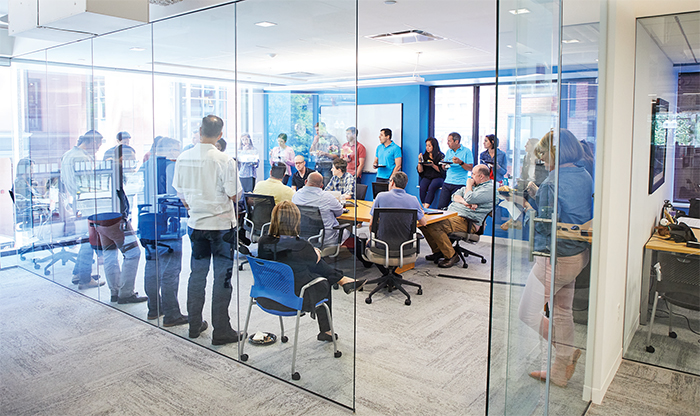
Tim DeMello ’81, P’18, founder of Gradifi
Late in the afternoon of March 13, Tim DeMello ’81, P’18, grabbed a cup of coffee and walked over to an office building in Boston’s Financial District. He stood in the lobby, looked at the people coming and going, and thought about the path his life has taken.
Thirty years earlier on that very date in that very building, DeMello’s career made a drastic departure. He had left behind his lucrative and stable job as a stockbroker to enter the crazy and uncertain world of entrepreneurship. Not everyone considered the move a smart decision at the time. “My friends thought I was insane,” says DeMello.
But standing in that lobby 30 years later, serial entrepreneur DeMello came to take a moment and reflect on everything that had happened after that March day, on the string of businesses he has started through the decades, on a career that has brought him rewards and fulfillment, and how, after all the ups and downs, he was still in the business of dreaming up a notion and making it a reality. “There’s artistry in starting a company, shaping an idea,” he says. “I do it because I love creating and innovating. It’s what I do.”
This wasn’t the first time that DeMello has taken time to commemorate March 13. He came to the same lobby on the 20th and 25th anniversaries of the day as well. DeMello considers it one of the two most important days of his career.
And that other day? It happened some years earlier, when DeMello was a Babson student and a fire was lit in his gut that still hasn’t gone out.
Striving for Simplicity
A life in entrepreneurship makes for full days. DeMello often wakes at 5 a.m., and before the business of the morning begins, he hits the pool. Working out is a regular part of his routine, whether he’s swimming, running, or biking. DeMello enjoys long runs along the Charles River, and a couple of months back he tackled San Francisco’s Escape from Alcatraz Triathlon. He once even did an Ironman. “I like pushing myself to a further place,” he says.
DeMello lives in an apartment in the Back Bay neighborhood of Boston. Once he finishes his morning workout, he takes a five-minute walk through Copley Square and past the Boston Public Library to the office of his latest startup, Gradifi. The bright, airy office sits above the hustle and bustle of Boylston Street, and pictures of runners hang on the walls, a nod to the nearby finish line of the Boston Marathon.

Photo: Pat Piasecki
Gradifi’s offices are located on Boylston Street, near the finish line of the Boston Marathon.
DeMello has a big mission with Gradifi. Founded in 2014, it’s seeking to lessen the heaps and piles of student debt that are burdening college graduates. According to Forbes, the total amount of student loans in the U.S. is $1.3 trillion, which exceeds the amount of debt from credit cards and auto loans. Some 44 million people have borrowed money for their education, and every May, as fresh graduates take off their caps and gowns, that number climbs higher. “The problem just keeps going,” says DeMello. “It’s really staggering.”
DeMello’s response was to create a new employee benefit. Through Gradifi, employers can make direct contributions each month to help pay their workers’ student loans. It’s proving a popular idea. More than 100 companies have signed up for the service so far, and, in December, Gradifi was bought by San Francisco’s First Republic Bank and is now a wholly owned subsidiary. DeMello’s hope is that student loan repayment one day will be as ubiquitous a benefit as 401(k) accounts or tuition reimbursement.
Kathy Borowy, Gradifi’s CFO, believes that DeMello has the diligence and drive to make that happen. “He doesn’t get distracted by noise. He’s focused on what he wants to do,” Borowy says. “When there’s something critical, the passion and intensity goes up 10 notches.” At the same time, he’s a visible leader who likes to walk the floor and talk to employees about what is going on, but he also trusts them to do their jobs. “He lets us figure out what we want to do. He doesn’t get in your way,” Borowy says. “He’s someone you enjoy working with.”
DeMello also is compelling when talking to the media and spreading the word about Gradifi. “He’s been a really good salesman,” says Doug Lowenstein, Gradifi’s COO. “He has a strength to describe what we do succinctly. He packages it in a way that people get right away.” DeMello works hard to get the message just right. Lowenstein says they spent a lot of time deciding what to call the benefit Gradifi is offering. They settled on Student Loan Paydown Plan, or SLP Plan for short. “He thinks things through thoroughly,” says Lowenstein. “I’ve learned there’s a lot of value in expressing an idea cleanly.”

Photo: Pat Piasecki
Tim DeMello talks with office manager Jacqueline Diamond.
Simplicity is the essence of what DeMello aims for in his work, as well as in his personal life. He strives to live in a way that’s uncomplicated and uncluttered. He doesn’t make big purchases. He doesn’t own property. He makes no investments. He eats dinner at the same restaurant, Post 390, almost every day, and for months has eaten the same meal: steak with a side of broccoli. His subdued office is free of distractions, and he always uses the same pen, the Pilot G-2 10, in part because it’s perfect for writing ideas on a napkin. His focus is on his business and the people in his life. “I don’t surround myself with big things. I like spending time with my kids. I like hanging out with my friends,” he says. “I like freedom of thought, freedom of movement. I think people have put too much complexity in their lives.”
An Idea Man
Growing up in Falmouth, Massachusetts, DeMello was the first in his blue-collar family to graduate from college. His mother was a stay-at-home mom, later a shopkeeper, and his father was an electrician who dreamed of a different life for his son. “I don’t want you wearing a tool belt,” he told him.
Besides the day he quit his job as a stockbroker, the other landmark day on the path to DeMello’s entrepreneurial career happened in 1978, when he was in his first year at Babson. On his way to baseball practice, DeMello was stopped by a professor, who asked the young man if he was going to hear the entrepreneurs speak at Founder’s Day. “I said, ‘What’s an entrepreneur?’” DeMello recalls. “I had no idea.”
The entrepreneurs on stage that day included Berry Gordy of Motown Records, Ray Kroc of McDonald’s, and Soichiro Honda of Honda. They were the first class inducted into Babson’s Academy of Distinguished Entrepreneurs, and DeMello listened intently. “I didn’t move,” he says. “I was mesmerized. I didn’t go to baseball practice. Entrepreneurship took hold of me that day.”
Inspired to act on his ideas, DeMello— who had played rugby for Boston’s Beacon Hill Rugby Club—decided to start a team on campus. Serving as captain and coach, he looked for the biggest men in Trim Dining Hall and tried to recruit them. An enthusiastic but inexperienced group assembled for the first practice. “About 35, 40 people showed up, and no one knew how to play,” he says. Thirty-eight years later, the rugby team is still going strong on campus. “I love rugby,” DeMello says. “We had the best time.”

Photo: Pat Piasecki
Gradifi employees gather for team lunches on Wednesdays.
After graduation, DeMello worked as a stockbroker for six years, but his entrepreneurial spirit didn’t fade. He kept a binder full of business ideas, and he dreamed of possibilities. When he left his job, DeMello started Wall Street Games, an interactive investment game. The company later added fantasy sports as well; this was long before the Internet made such activities common. Wall Street Games, later renamed Replica, used a call center to interact with players. The company landed DeMello on the cover of Inc. in 1988. “That was huge,” he says. “It put me on the map.” Other ventures followed. In 1993, he founded Streamline.com, an early e-commerce company. In 2004, he launched Ziggs.com, a social networking site for business professionals. And in 2009, DeMello started Spotlight Media, which provided daily shopping deals.
With Gradifi, DeMello now has started seven businesses, most of which have been sold or gone public. Along the way, he also established Babson’s Founder’s Fund, in which entrepreneurs in the early stages of their ventures pledge a percentage of their future equity to the school. The fund has resulted in more than $3 million in donations.
All this success hasn’t slowed the flow of ideas that DeMello has for possible ventures. In his apartment, he is constantly jotting down thoughts, and he loves the sight of a clean whiteboard, all that space waiting to be filled with purpose and potential. “It’s one of my favorite things in the world,” he says. Whenever he has an idea for a business, he buys the domain name just in case. He owns about 70 of them.

Photo: Pat Piasecki
DeMello talks with daughter Nikki, a communications manager at Gradifi.
“He never goes anywhere without a notebook,” says Nikki DeMello, Tim’s daughter. Growing up, she and her brother, Zac ’18, would visit their father at his various ventures, and now Nikki works as a communications manager at Gradifi. “If we go to the beach,” she says, “he brings a book, a notebook, and a G-2 10 pen.”
Growing Gradifi
Babson may have inspired DeMello, but it also provided him with a network of friends and professionals who have aided and encouraged him through the years. That network is evident in the story of Gradifi. The most significant Babson connection was Jim Herbert ’66, whose bank, First Republic, bought Gradifi late last year (see sidebar), but those College relationships popped up again and again during Gradifi’s formation. DeMello first got the idea for the company in 2013 while listening to a discussion about student loans at a Babson Board of Trustees meeting (DeMello served on the board for nine years). Later, an old rugby buddy who works in real estate, Bill Anderson ’83, found the Boylston Street office for Gradifi, and Steve Connelly ’82 of ad agency Connelly Partners shaped the company’s brand. Additionally, much of the $5 million that DeMello raised from angel investors came from Babson colleagues.
Another rugby friend, Dick Dubois ’82, COO of the assurance practice at PwC, provided Gradifi with a big boost in its early days. The company was looking for a launch site to give its benefit a test run, so DeMello invited Dubois to lunch at the Palm, a steakhouse in Boston’s Financial District, and sketched out his vision for Gradifi on a napkin. “I immediately understood that it was a great strategic fit for my firm,” says Dubois. PwC has an overarching purpose of tackling large societal problems, and student debt is a significant personal issue for many of the company’s 50,000 U.S. employees, given that their average age is 27. Dubois went on to introduce DeMello to Tim Ryan ’88, PwC’s U.S. chairman and senior partner, who also was excited to work with Gradifi.
Having PwC on board was a coup, but now Gradifi had to deliver. When DeMello started talking with PwC in 2014, Gradifi didn’t even have a proper office yet, much less a staff. DeMello had no employees save for future COO Lowenstein, who then was only an adviser, and the two were meeting daily in a cafe in the John Hancock Tower. Ramping up to provide their service to thousands of PwC employees would take hard work. “When you think about a startup, that first client is really critical,” DeMello says. “The pressure was huge. We had to make it work. I knew if we could make it work for PwC, we could make it work for everyone. We took every piece of feedback they gave us.” By summer 2016, PwC was offering loan repayment to all its eligible U.S. employees, and Dubois labeled the benefit a big success, earning goodwill with workers and helping with retention efforts.
Other triumphs have followed for Gradifi, and nowadays the company has 48 employees and is planning to expand its office space. But DeMello admits that achievements in entrepreneurship often come with a cost. In Gradifi’s early years, he was working 70, 80 hours a week. “This is really hard to do. It’s not an easy road. It’s highs and lows and everything in between,” he says. “When things work, it’s amazing. When they don’t, it’s horrible.” Other people in an entrepreneur’s life might not understand all the sacrifice a venture requires. “It’s hard for people around you. There is a reason I’m single,” says DeMello, but then adds, “That’s fine with me. I’m good with it. But it takes its toll.”
That being said, DeMello has no plans to stop. “I’m never going to retire,” he says. “I don’t even know what that means. I really think I could do this for 30 more years.” As proud as he is of Gradifi, he can’t help but look to the future. When asked what his favorite is among the companies he has launched, he says simply, “The next one.”
Want to network with other people in Babson’s global community? The recently launched Babson Connector lets you engage with Babson-founded companies, share ideas for ventures, recruit Babson talent, and more. Sign up at Connector.Babson.edu.
